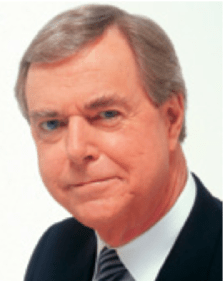Stockholm Syndrome: An Epiphany About Canada at a Faraway Dinner
Column / Don Newman
There is a truism that if you want to understand your country, you should go abroad and look back at it from a distance. On trips abroad, I have sometimes had that experience, perhaps no more vividly than a trip to Stockholm for the Nobel Prize awards ceremony.
The Canadian ambassador to Sweden lives in a beautiful house outside the centre of Stockholm, on one of the waterways linking the archipelago on which the Swedish Capital is built. Ships from St. Petersburg or points in Finland cruise by the beautiful terrace at the back of the House. It was here that I had an epiphany about my country, Canada.
That epiphany came to mind earlier this year, as the coronation of King Charles III flooded the airwaves in May. The pomp and pageantry of the occasion attracted viewers around the world. It was a timeless ceremony that reaches back centuries. The few more modern pieces that had been added seemed to pass unnoticed. It was a ceremony that only the British still do, And they do it well.
But in Canada, the coronation was also held against a simmering debate about whether the new King should be “our” King. This is not an entirely new debate. But there had been a general consensus that as long as the new King’s mother, Queen Elizabeth, was on the throne, her popularity and longevity were sufficient to maintain the British monarch as the Canadian head of state. However, as the years rolled by and the demographics of Canada began to change, speculation increased as to what would happen when the Queen was no longer here.
Then suddenly, she no longer was here. Last September, with only two days’ warning that she was gravely ill, she was gone, replaced by her eldest son, a seventy-four year old senior citizen who seemed to have been standing by to assume the throne forever. After the initial period of mourning, the debate began among republicans and then in the wider media sphere: Should Charles III be King of Canada, or should the ties that have bound us together all these years be severed?
Opinions on that question are shaped by age, experience and nostalgia. Many of us remember the replacement of the Red Ensign as the flag of Canada by the current Maple Leaf in 1965, and the bitterness and hard feelings that surrounded that change. Replacement of the monarchy would not create the same splits, but there would be anger, hard feelings, and national unity questions raised just the same.
In my own career I was presented to the Queen on three different occasions. I have met all the other royals with the exception of Prince Edward. I was comfortable with the role they played in Canada. Until I went to Sweden. The Canadian ambassador was hosting a lunch at his residence to which my wife and I had been invited. Most the the other guests were Swedes. As we were waiting to go into lunch, one of the Swedish guests noticed a picture of Queen Elizabeth featured prominently on a wall in the foyer.
“What is she doing there?” he asked.
I started the usual explanation that the Queen was Canada’s head of state, but that she didn’t live in the country, and was represented by a Canadian Governor General. I also pointed out that the Queen had no authority or power, and the Governor General only rarely did if there was a Parliamentary deadlock.
“If the Queen of England is your head of state, you are still a colony,” my Swedish questioner insisted.
I let the matter drop. But I began to look at the monarchy in a different way. If the British monarch is our head of state, citizens elsewhere will always be inclined to see an asterisk next to Canada as a global power.
Over the years, the ties have loosened between Canada and Britain. Full control of foreign policy was obtained in the Statute of Westminster in 1931. Appeals to the British Privy Council as the final legal arbiter ended in 1949, two years after Canadians became citizens of Canada and not just British subjects. The first Canadian-born Governor General, Vincent Massey, was appointed in 1953, ending the long line of minor British aristocrats that had filled the job.
And now, with the death of Queen Elizabeth, it is time to take the final step. Canada has been an independent country for over one-hundred and fifty years. Now is the time for a Canadian head of state, a conclusion I first reached outside of Canada, on trip to Stockholm.
Contributing Writer and columnist Don Newman, an Officer of the Order of Canada and lifetime member of the Parliamentary Press Gallery, is Executive Vice President of Rubicon Strategy, based in Ottawa.

